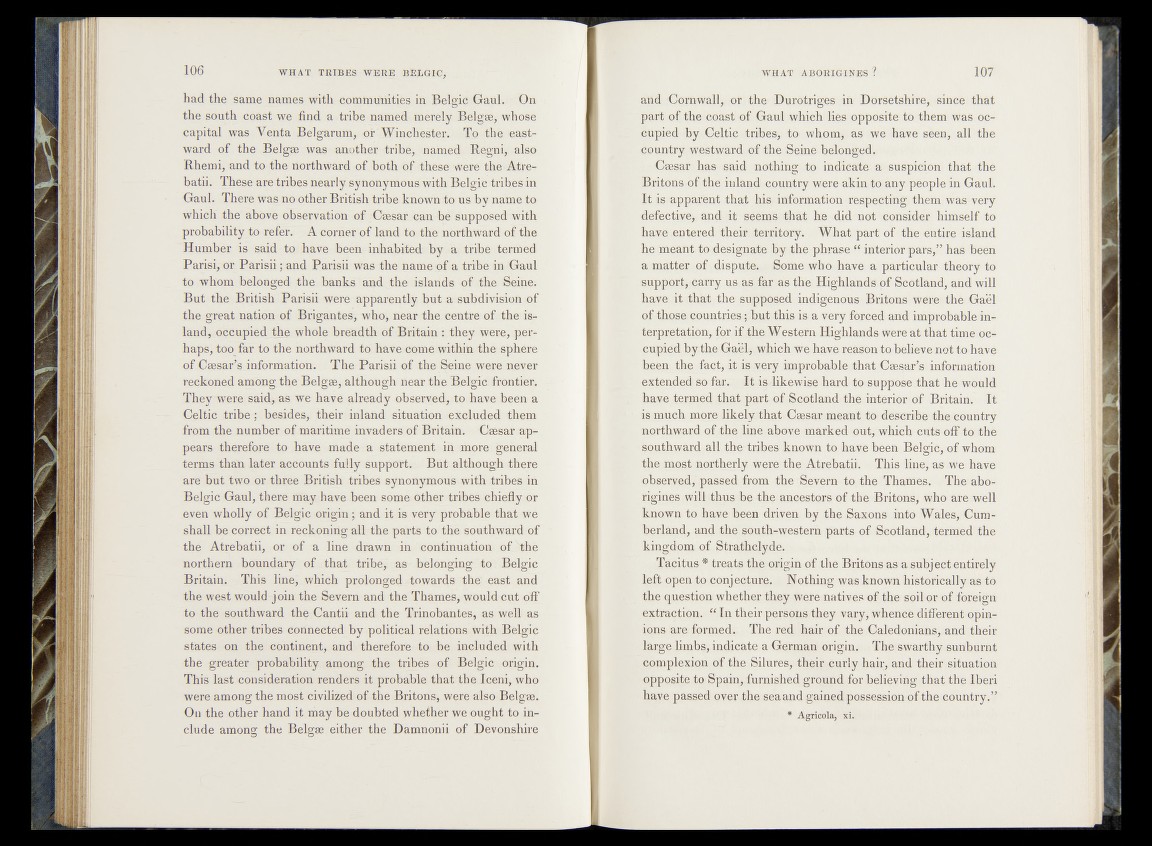
had the same names with comm unities iü. BelgictGapt. - On
the south coast we find a »tribe named merely Belg®, whose
capital was VentaBelgarum, pr'Winchester. Tp the- 'eastward
of the Belg® was another-tri,J^)Jnam.ed~- Regni, also
Rhemi, and to the northward of hoth'hf• fthesei were the^tTe-
batii. These are trihes'nearly.synonymous with BelgihHaSbes in
Gaul. There was no other British tribe known to üs by name fd
which the above observation of C®sar can be supposed with
probability to refer. A corner of land to the northward r a the
Humber is said to have been inhabited by a tribe termed
Parisi,or P a rish ; and Parish was the name of a tribed© Gaul
to whom belonged the banks and the islands of the -Sniper
But the British Parish were apparently but a:subdivision of
the great nation of Brigantesr, who, near the centre of. the*is&
land, occupied the whole breadth of Britain : they~were;;per^
haps, to p la r to the northward to have come within the sphere
of Jp;®sarJs Jhformation. The Parish of theS^ia^iwerdfE^er
reckoned among the Belg®, although near the Belgic frontier.
They were said, as we have already observed^tb;haveiJ>een a
Celtic tribe : besides, their inland, situation excluded' them
from the number of maritime invaders of-Britain. C®sar appears
therefore to have made a statement in rnoreigerteral
terms than later accounts fully support. But although there
arb but two or three British tribes synonymous with tribes in
Belgic Gaul, there may have been some other tribes ehiefly&pï
even wholly of Belgic origin; and it is very probable that-fWe,
shall be correct in reckoning all the parts to the south ward o£
the Atrehatii, or of a line drawn in continuation- of.'töië
northern boundary of that tribe/ as belonging: to'. Belgic
Britain. This line, which prolonged towards the' east and
the west would-join the Severn and the Thames, would cut off
to the southward the Cantii and the Trinobantes, as well as
some other bribes connected by political relations with Belgic
states on the continent, and therefore to be included with
the greater probability.,among the tribes of Belgic origin.
This last consideration renders it probable that the Iceni, who
were among the most civilized of the Britons, were also Belg®.
Ou the other hand it may be doubted whether we ought to include
among the Belg® either the Damnonii of Devonshire
■ the Durotriges in Dorsetshire^ since that
part of the 'cpast1 ©frfljanll -which lies opposite to them was oc-
« piedaby-tCeltic tribes, d)6 whom, i ^ -'fa-avO seen, -,all the
&un try i^©stwardy-)0.f the Seine belo^^y-*-*
said .noihjnggtp indicate ai suspicion that the
Britpgs^of th # n la n d countryiwere akin to any people in Gaul.
It is apgaj#|$ iidiagk his ipfofmaifeiio^lre&pectinM th$%!i was very
defe'©tpe>> ap,d ;it seems <tha5fer,^t-did himself to
hay^ept&^ed^ their.-femtory. -What part, of the-entire island
he .meant, to idesigp^te^y-the phrase interior pars,” has been
a„m^tte(Ewp.f dispute.. (Some who have a particular Ihqpryt'to
impport^feaify u s ^ s ii^ a s the* highland d pf ^oQtrarid!, and will
.Jilj^fit^thatTheiOpposed indigenous-Britons?were >t.he> Gael
loj^fh^^cMuntrles. :-,.butethls is a Very forced and rpiSlprobablein-
tcrpf.eta^ipn*, if ib e ^ g ^ tp rn Highlands were at that timemed
reason tq-believ e-snot tofhave
been thp^fjiQ^jil isiyery. improbable that (3®sar’s1 information
extendedjrso far. ^ ^ i^ fik ew ise hard to suppose .that he would
have t e ^ ^ ^ ^ p ^ r ^ ^ E Scotland the- interior of Britain. It
is much more likely, that*C®sar meant to describe the country
mprtjpyar.d ^th^ili^fe^abesve,marked pu.t,!which cu'ts off to the
Southward all the* trifeeslknown to -have been BeMe* of whom
theame^t northerly wereithe Atrehatii. This iine,j as1 we have
observed,"passed from the Severn -to the Thames;--‘4 The aborigines
will thus be the ancestors of the -Britons, who are well
known to have? «been- driven by the Saxons^into Wales, Cum-
^ r l a n d , and the south-western parts of sScotland, termed the
:kingd,oni;r of^ ptrathclyde,i| i
Tacitus * treats the origin of the Britons as a subject entirely
left open to conjecture. - Nothing was known historically as to
the question whether they werenatives of the soil or of foreign
extraction.,-“ In their persons they vary, whence different opinions
are formed. The red hair of the . Caledonians, and their
large limbs, indicate a German origin. The swarthy sunburnt
complexion of the Silures, their curly hair, and their situation
opposite to Spain, furnished ground |for believing that.-the Iberi
have passed over the sea and gained possession of the country.”
* Agticola, xi.